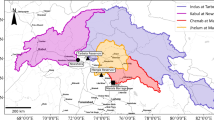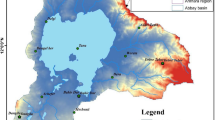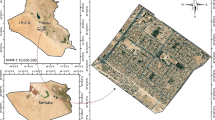Abstract
A technique of long-term forecasting of outliers of a random runoff process in the low-water period in case of possible climate change is proposed. A stochastic model of runoff formation based on the Fokker-Plank-Kolmogorov equation (FPK) was used to estimate hydrological implications of climate change. The frequency and duration of a 30-day runoff below 80% probability were considered as principal characteristics of the forecast. They substantially influence the development of the strategy of water resources management in perspective and can be used for an environmental estimate of implications of changes in the hydrological regime in low-water periods. The forecast results are generalized in the form of maps.
Similar content being viewed by others
References
M. V. Bolgov and I. A. Filippova, “Threshold Stochastic Models of Low Flow,” Meteorol. Gidrol., No. 3 (2006) [Russ. Meteorol. Hydrol., No. 3 (2006)].
L. N. Bol’shev and N. V. Smirnov, Tables of Mathematical Statistics (Nauka, Moscow, 1983) [in Russian].
N. V. Viktorova, Studies of Applicability of Stochastic Models of Forming Summer-Fall and Winter Minimal Runoff for Estimating Hydrological Implications of Anthropogenic Climate Change, Candidate’s Dissertation in Technical Sciences (Russian State Hydrometeorological University, St. Petersburg, 2002).
Yu. A. Izrael et al., “Adaptation of Water Economy of the Russian Federation,” in Global Changes of Natural Environment. Selected Scientific Transactions (Nauka, Moscow, 1997) [in Russian].
V. V. Kovalenko, Modeling of Hydrological Processes (Gidrometeoizdat, St. Petersburg, 1993) [in Russian].
A. K. Mitropol’skii, Techniques of Statistical Calculations (Nauka, Moscow, 1971) [in Russian].
D. Ya. Ratkovich, Long-term Oscillations of River Runoff (Gidrometeoizdat, Leningrad, 1976) [in Russian].
A. V. Rozhdestvenskii and A. I. Chebotarev, Statistical Methods in Hydrology (Gidrometeoizdat, Leningrad, 1974) [in Russian].
V. A. Rumyantsev and I. V. Bovykin, Spatial and Temporal Regularities of Oscillations of the Eurasian River Runoff, Ed. by A. A. Sokolov (Nauka, Leningrad, 1985) [in Russian].
Author information
Authors and Affiliations
Additional information
Original Russian Text © N.V. Viktorova, M.N. Gromova, 2008, published in Meteorologiya i Gidrologiya, 2008, No. 6, pp. 72–80.
About this article
Cite this article
Viktorova, N.V., Gromova, M.N. Long-term forecasting of characteristics of minimal river runoff discharges in Russia in case of possible climate change. Russ. Meteorol. Hydrol. 33, 388–393 (2008). https://doi.org/10.3103/S1068373908060071
Received:
Published:
Issue Date:
DOI: https://doi.org/10.3103/S1068373908060071




